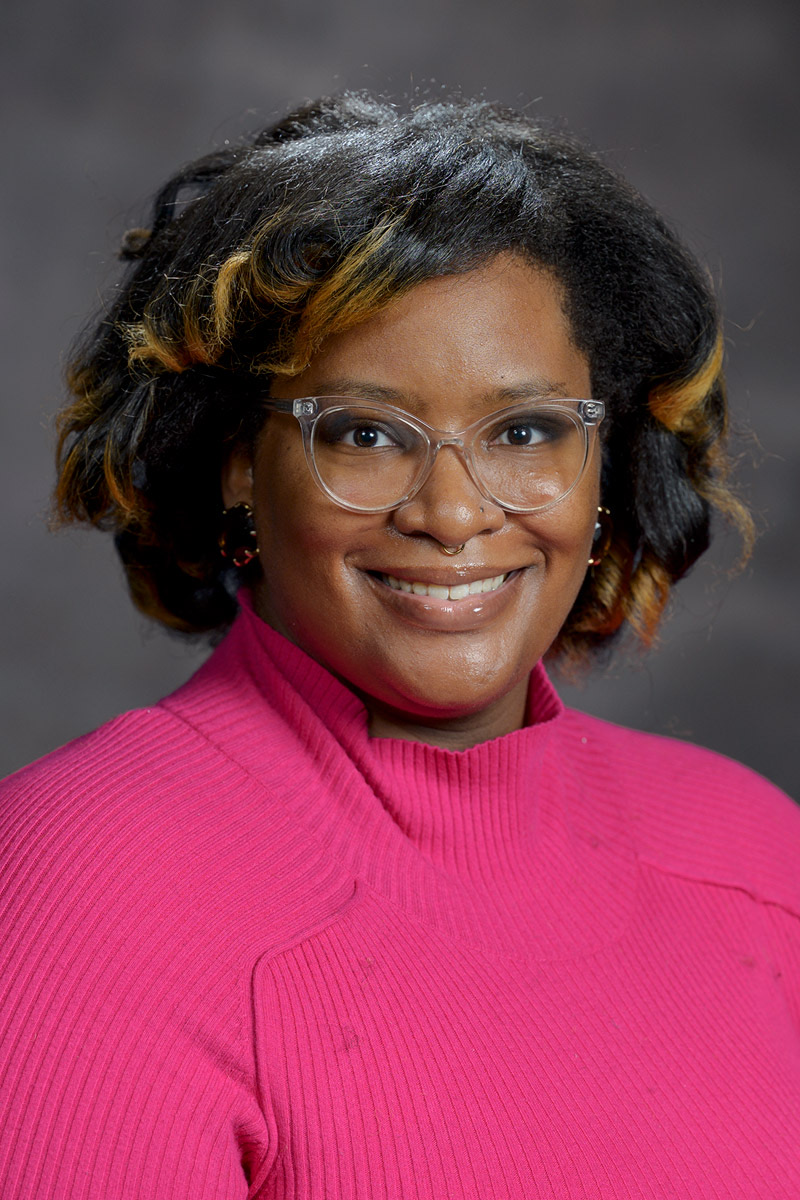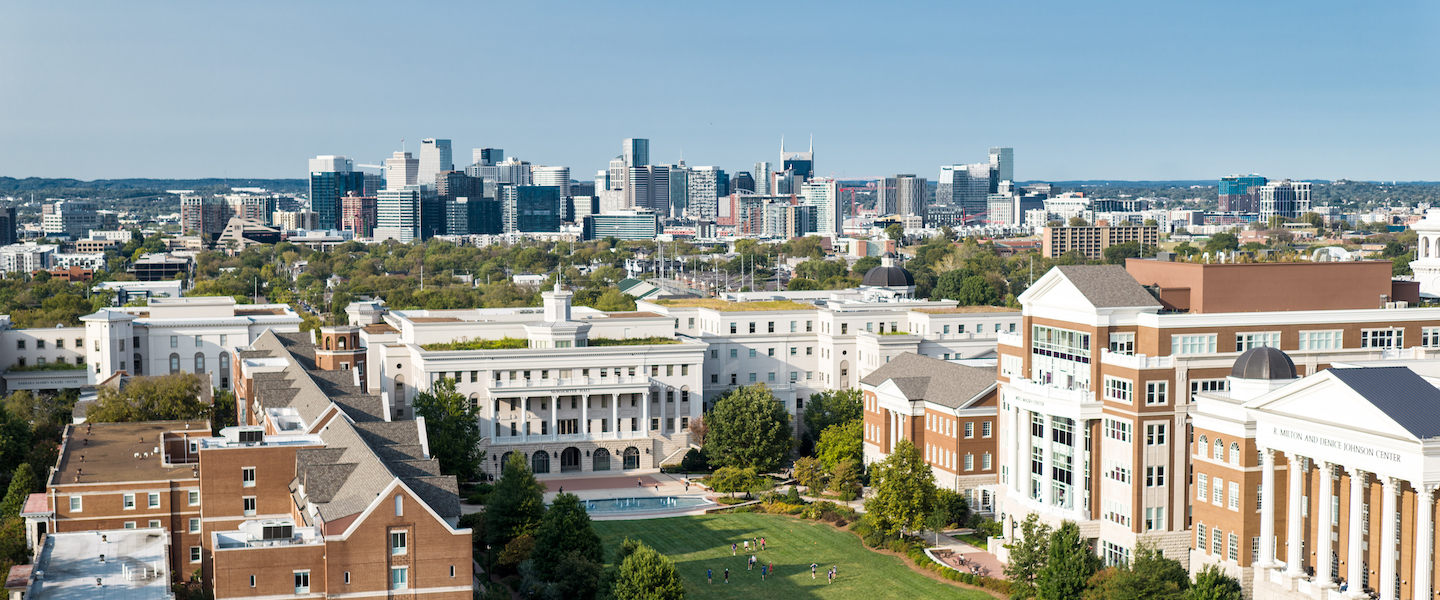Her journey from luxury fashion to academia: bridging diversity, scholarship, and empowerment at O'More College
 Meet Nia Allen: O’More College of Architecture & Design’s first faculty fellow.
Meet Nia Allen: O’More College of Architecture & Design’s first faculty fellow.
Originally from Cleveland, Nia Allen has a rich background in the fashion industry and is currently pursuing her Ph.D. in hospitality and retail management at Texas Tech University. Her academic journey is marked by an impressive array of achievements, including a bachelor’s degree from Clark Atlanta University and two master's degrees: one in communication from Loyola University and one in fashion industry studies from Kent State University.
With over a decade of experience in the luxury fashion landscape, Allen has cultivated an extensive career that spans prestigious roles at renowned brands like Nordstrom and Gucci. Her expertise extends beyond traditional retail, encompassing celebrity personal styling and entrepreneurial initiatives. Notably, she organized her own fashion weekend, which has been instrumental in creating pathways and opportunities for African Americans seeking to establish themselves in the fashion industry.
Currently, Allen's academic research focuses on the intricate and complex relationship between the luxury fashion retail industry and African American consumers and professionals. Her scholarly work is complemented by her professional writing, with contributions to esteemed publications such as Business of Fashion, PopSugar, Business Insider and xoNecole.
At O’More, she teaches in the fashion merchandising program. This fall, she taught visual merchandising and merchandise simulation classes. In the spring, she’ll teach retail buying and evolution of fashion 2 as well as hosting numerous campus events.
The following interview has been edited for brevity and clarity.
How did you end up at Belmont?
I knew I always wanted to go into fashion. Even as a young girl, that was my thing. I went to an HBCU in Atlanta where I studied fashion and had a cool internship working with a celebrity stylist. I ended up getting fired, and it really lit a fire under me to make sure something like that never happened again. After college, I worked for Nordstrom and Gucci, then went to Loyola and earned a master's in digital media.
Once I graduated, I decided to open a luxury consignment shop. The week I had the pop-up shop, I found out I was pregnant with my son, so I decided to go back to work. After I had him, I went to Kent State to get a master's in fashion, and it just catapulted from there.
I graduated during COVID and decided to get my Ph.D. from Texas Tech. When I was there, I knew one of the places I wanted to end up was Nashville. I found a fellowship at MTSU and discovered O'More through that.
What was your first impression of O’More?
It felt serendipitous. As soon as you walk into O'More, you feel the creative energy. It's a fun, vibrant community, and my students are open and excited to learn. Everyone is excited about what is happening at O'More –– happy energy is infectious. Everyone is also so willing to listen to my event ideas and the things I would like to do, which is super cool. O'More is very big on community, including within the faculty.
What about Nashville called your name?
It's one of the largest growing cities for fashion businesses, and I knew a city like New York was not for me. I wanted the Southern comfort feel, and it's one of those places where you don't need to go far to find something to enjoy. There are so many things happening, and it's definitely lived up to the hype.
How has it been teaching visual merchandising and merchandise simulation?
I was a visual merchandiser at Macy's, Gucci and Target. Visual merchandising is so interesting because there's this idea that it's just changing mannequins. But we were painting walls, tearing down settings, I'm on the ladder, hanging up shelves, using the style guide. One of our guest speakers worked in costume curation for a museum. That, as well as my own background, really helped transform my students' idea of what visual merchandising looks like and helped get them excited.
Merchandising simulation has been a learning curve for me, too. Being able to assist them through the process, help them identify a need and see their eyes light up when they say 'I never thought about that' was really cool. We have mentors from eight companies — Nike, Spanx, Banded2Gether, Victoria Dunn, LaLa Land Creative Co., Fanatics, Natural Life and Kirkland's — that students are paired with as they plan the launch of their own product. Many of the mentors are O'More alumni.
What is your Ph.D. dissertation on?
My dissertation is based on luxury fashion and its relationship with Black women — the good, bad and the ugly, motivated by my own experiences of walking into luxury stores and working in luxury fashion and feeling alone. Sometimes the treatment isn't the best, so that's how I came up with my dissertation that I will defend in this coming spring, which I'm so excited about.
What kind of events are you working on through O’More?
I have a few different events going on next semester. Many of my students are passionate about women's rights, so I decided to put together a WELL Core in January called 'Women in the Grey' where we'll bring in law professionals and talk about the women's suffrage movement and all the layered aspects of women's rights. I've also worked on a diversity in design series, and events for Women's History Month and Black History Month. It's super important for people to realize that my experience is intersectional. I can walk in the room as a woman, but I'm also a Black woman, and sometimes my skin color shows first. I'm always very honest with my students about my passions and my convictions. It can be a teachable moment to get them to think critically.
What’s a moment this semester when you thought “I’m in the right place”?
I remember I was in class, and one of my students said, 'You break things down in such a cool way. I don't see things like how you see things yet.' That made me feel like, 'Okay, you're understanding, and you're seeing that there's more to this, and you're learning something.'
Sometimes as professors, we don't know if our students are paying attention. It felt like confirmation that I was doing the right thing and that my students feel they get me, and I get them. And now that student wants to go into visual merchandising, so maybe it did change her perspective.
What are you looking forward to most about teaching retail buying and evolution of fashion?
With retail buying, students don't always realize how much math goes into it. I'm looking forward to taking it slow and helping them understand that though it can be difficult, it's a necessary skill.
With evolution of fashion, I'm excited to get them excited about designers they maybe have never heard of. I'm going to bring in Tonya Blazio-Licorish, archive editor for Women's Wear Daily, to discuss costume history from an editorial perspective and explain how these concepts shape future textbooks. These diverse perspectives really help foster an inclusive environment.
What advice would you give to students?
I wrote an article for Business of Fashion this year. It's important for people to know that it was a two-year culminating process, and I was told no a million times. It took a year and a half for the story to get greenlit — countless conversations, countless pitch emails. Nothing is going to come quick. Most of us need to put in the work, so you need to grant yourself as much grace as possible and be prepared for the ride.
I've been in magazines, on podcasts — and the moment in my career where I felt like I'd made it is when my son thinks I'm famous. He'll tell people, 'My mom has been in the magazine and she's on TV,' and if he thinks I've made it, then I truly have. That's all that matters to me. I bring him to everything, because I want him to be in spaces where he can see women shine and be successful. But also, so that he knows he can do anything he sets his mind to.
Learn more about fashion merchandising at Belmont!

